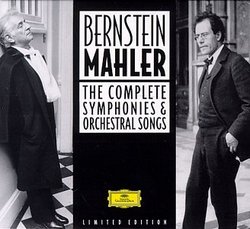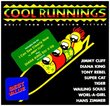| All Artists: Gustav Mahler, Leonard Bernstein, Barbara Hendricks, Dietrich Fischer-Dieskau, Wiener Philharmoniker, Christa Ludwig, Philip [1] Smith, Joseph Alessi, Helmut Wittek, Jaap van Zweden, Lucia Popp, Andreas Schmidt, Agnes Baltsa, Judith Blegen, José van Dam, Hermann Prey, Thomas Hampson, James King, Glenn Dicterow Title: Mahler: The Complete Symphonies & Orchestral Songs / Bernstein Members Wishing: 1 Total Copies: 0 Label: Deutsche Grammophon Release Date: 11/10/1998 Album Type: Box set Genres: Pop, Classical Styles: Vocal Pop, Opera & Classical Vocal, Symphonies Number of Discs: 16 SwapaCD Credits: 16 UPC: 028945908021 |
Search - Gustav Mahler, Leonard Bernstein, Barbara Hendricks :: Mahler: The Complete Symphonies & Orchestral Songs / Bernstein
 | Gustav Mahler, Leonard Bernstein, Barbara Hendricks Mahler: The Complete Symphonies & Orchestral Songs / Bernstein Genres: Pop, Classical
This 16-disc set contains what is without a doubt the most distinguished collection of Mahler performances ever to have been assembled in one place. DG has sensibly collected all of Bernstein's Mahler for Polygram labels, ... more » |
Larger Image |
CD DetailsSynopsis
Amazon.com essential recording This 16-disc set contains what is without a doubt the most distinguished collection of Mahler performances ever to have been assembled in one place. DG has sensibly collected all of Bernstein's Mahler for Polygram labels, including the London "Das Lied von der Erde," and all of the orchestral song cycles: "Song of a Wayfarer," "Kindertotenlieder," "Rückert-Lieder," and "Des Knaben Wunderhorn." All of these recordings have been issued separately to general critical acclaim, and despite a veritable warehouse of new Mahler discs in the '90s, Bernstein's versions by and large still reign supreme. For this, his second complete symphony cycle, Bernstein chose three great orchestras and programmed with each one the most suitable symphonies. The New York Philharmonic, probably the greatest Mahler orchestra in the world, gets Symphonies Nos. 2, 3, and 7. The Vienna Philharmonic plays Nos. 5, 6, 10, and 8 (a live recording from the Salzburg Festival that replaces what would have been a New York Eighth had Bernstein not died). Finally, Europe's great Mahler orchestra, the Royal Concertgebouw of Amsterdam, gets Nos. 1, 4, and 9. At mid-price, this is Mahler deluxe, an essential set for anyone interested in the composer, and a terrific gift idea if you're looking to make a convert or two. --David Hurwitz Similarly Requested CDs
|
CD ReviewsWhat should we make of Bernstein's Mahler now? Santa Fe Listener | 12/14/1999 (3 out of 5 stars) "I must say that reviewing these recordings is a frustrating experience for me. I got to know Mahler through Bernstein's Mahler (both his old and new cycles). It is through Bernstein that I fell in love with Mahler. However, I must say that as time passes, the more reservations I have about Bernstein's Mahler recordings. He distorts the music too often, exaggerating the dynamics, adding tempo changes not marked in the score, sometimes even going against Mahler's own marked balances that practically amount to re-orchestration. Mahler was so specific about everything in his scores -- I wonder what he would've felt if he heard Bernstein conduct them? Time and time again when I listen to these recordings with a score I often ask myself why Bernstein had to do this or that when Mahler's way would be perfectly fine? Don't get me wrong -- I think Bernstein's intensity is absolutely stunning. It suits the Third and Sixth symphonies the best, not to mention his gorgeous recording of the Kintertotenlieder and Ruckertlieder with Thomas Hampson. Elsewhere I'm less certain. Why interpret the first movement of the Second as a funeral march when it is marked Allegro maestoso? Why the many unmarked tempo changes in the Fifth's finale? There are lots of exaggerated tempi -- too slow throughout the entire First and Second, as well as such places as the scherzo of the Fifth, absolutely incoherent tempi shifts in the finale of the Ninth, and so forth. Bernstein's approach helps the Third and Sixth a lot, but elsewhere I am less certain. What we need today is a Mahler conductor who will observe every detail of the score yet interpret them with as much passion and fire as Bernstein did. No one at the moment, fits the bill IMHO -- though Kubelik's underrated DG cycle is quite an achievement, pointing the way to how it could be done (and at a very good price too), and Rattle at his best could combines the best of accuracy and passion (though he's rather inconsistent). Too often Mahler becomes sentimental under Bernstein, while true, unforced yet sincere sentiment (yes, there IS a difference) is forgotten." Which of Bernstein's two Mahler cycles is better? Santa Fe Listener | Santa Fe, NM USA | 06/27/2006 (5 out of 5 stars) "Most buyers aren't in the market for a complete Mahler cycle from one conductor, but if they were, the two from Bernstein contain many great performances. I've reviewed the contents of the Sixties cycle on Sony and this later one from the Eighties (contianing many live performances) on DG, taking them one symphony at a time. But it's worthwhile to give a sense of the strongest and weakest parts of each set. Cycle #1: By general consensus the performance of Sym. #3 is one of the glories of this cycle and perhaps the most inspired Mahler condcuting Bernstein did on disc. It has all the freshness of discovery--LB was new to Mahler in 1961. Sony's 20-bit remastering makes the original analog sound quite good--in fact, there's no need to comment on the sound quality of these NY Phil. recordings, none of which are bad. Expect the deep sound stage and wide stereo separation that Columbia Records favored at the time. Bernstein also put his stamp on Sym. #7 in such a way that no one would ever hear it the same again. 'The Song of the Night,' as this work was dubbed, had almost no life either on disc or the concert stage (Mahler champions as prominent as Bruno Wlater never performed it). Not only did LB prove that this was coherent music, he made an unforgettable drama out of the Seventh. This is his signature recording of the work. Two other great performances stand out: Sym. #2 and #4, each rendered with amazing imagination and a huge range of emotions. The accusation that LB went over the top in the Second is unjustified--he is often tender and delicate--but there's no doubt that he takes an apocalyptic view of the finale. Whatever you think about his approach, he single-handedly revolutionized the way that the Resurrection Sym. was played. In Sym. #4 the classic recording was by Bruno Walter, but LB added more depth, imaginaiton, and excitement. Lyric soprano Reri Grist has come in for a good deal of criticism in the vocal finale, but I think she fits beautifully into LB's overall conception. In the middle of the pack, as it were, we get LB's readings of Sym. #1 and #9. He went on to conduct greater readings of both works, especially the Ninth. In person LB's First was a real showpiece, but somehow Sony's sonics are not up to the conductor's vision. In the cse of the Ninth, the NY version would qualify as an outstanding performance if there weren't so many truly great ones from Karajan, Bruno Walter, James Levine, and Barbirolli, among others. Bernstein himself would add two of the greatest, both on DG. I find a few problems wiht Sym. #5, #6, and #8 in the first cycle. For many critics all three are great recordings. For some reason, I have never warmed up to either of LB's versions of Sym. #5, where for once he does manipulate and exaggerate to the point that the spirit of the work seems lost in histrionics. Sym. #6 is too brisk in the first movement to let the music expand to its visionary potential, and in the other movements Bernstein seems less expressive than he could be. The Eighth is unmathced in the excitement and joyousness of Part 1, and for some listeners the whole symphony remains on that exalted level. I find that LB is too studied in Part 2, and my attention wasn't held. He does elicit very beautiful singing and playing, however. It should be noted that this performance is with the London Sym. and a host of fine English singers. To the end of his life Bernstein resisted Deryck Cooke's completion of the Tenth Sym., agreeing to conduct only the shattering Adagio. which Mahler had essentially finished in full score. Bernstein's reading with the NY Phil. is one of the most searing accounts this magnificent fragment has ever received, equaled by his later live reading with the incomparable Vienna Phil. Cycle #2: It should be said right off that DG's digital sonics are in a different league from what LB got in New York. Even though several venues were involved (Vienna, Amsterdam, New York), and many recordings were under live concert conditions, the DG engineers triumphed. They favor closer mike posiitons, solo highlighting, and a vivid sound stage compared to their predecessors in New York. As to the interprettions, with a few exceptions--the most prominent being Sym. #6--Bernstein did not drastically change his views from the first cycle, and in some cases the readings feel almost identical (Sym. #2 and #7, for example). The most interest centers on the works where LB clearly outdoes his younger self. At the top of the list I would put Sym. #6 and #9. In the former he achieved one of the classic Mahler reacordings of the modern era. His Sixth has slowed down by 2 min. in the first movement, giving the music room to expand properly. The Andante is heartbreaking and heartwarming at the same time. The finale is an explosion of genius on Mahler's part that LB resonates with perfectly. Almost the same can be said of the Ninth, where the conducting reaches deeply moving areas of expression. The finale is drastically slow (as is Levine's, to similar devastating effect), which some critics find excessive. But it's a truism that no tempo is right or wrong; everything depends upon being drawn into the world of the music. LB achieved a great Ninth but would surpass himself with a live performance from Berlin in 1979, also on DG. Almost as great is Sym. #1, which on DG receives a flawless performance packed with excitement. I'm not sure that LB's reading actually changed, but the superlative sonics and the spine-tingling playing of the Concertgebiuw weren't matched in New York. The next thing to ask is where Bernstein fell short of his earlier versions. The Sym. #2, #3, and #4 from New York were one of a kind, representing LB's early and most exciting explorations of Mahler's world. Their counterparts on DG are also strong, but I don't think they rise to the heights he achieved earlier. The only sharp criticism I have is with the use of a boy soprano in the finale of the Fourth; musical as he is, a boy is too undeveloped to capture what Mahler intended. It should be said, however, that if the earlier NY versions didn't exist, these would be outstanding performances. I feel much the same about Sym. #7, where LB's first recording set a standard that only two or three rivals have come close to, but his DG remake, which was a return to the NY Phil. in oncert from Lincoln Center(as are Sym. #2 and #3), feels fractionally less overwhelming. It's in better sound, however. The one symphony I can't compare is the Fifth, which doesn't satisfy me in either cycle. The DG version with the Vienna Phil. convinces many listeners, and some critics call in unsurpassable, but I am not on its wavelength. That leaves Sym. #8, which Bernstein didn't live to record for commercial release. DG reached into its vaults for a live 1975 radio tape from Vienna, and although it has flaws in execution, including some rough singing in Part 2, LB's conducting is superlative, more ocmpelling than his version from London. Paired with this symphony is a 1974 reading of the Adagio from Sym. #10, also with the Vienna Phil. As you'd expect, it's an inspired, searing reading, just like the NY version. How ot sum up? If money were no object, I'd own both cycles for the pleasure of Bernstein's unqiue inspiration. If I had to pick and choose, I'd take Sym. #2, #3, and #4 from New York, Sym. #8 from London, and the rest form the DG cycle." Superbly performed and recorded, a milestone for Mahlerites. Cam Mackey (cmackey@haverford.ed | Philadelphia | 04/29/1999 (5 out of 5 stars) "These recordings by Bernstein are truly seminal in the Mahler discography. The live recordings capture Bernstein's unparalleled energy and insight into Mahler's music, and even the analogue recording of the Eighth possesses a certain opulence of sound. The recordings capture the shimmer of Vienna's Musikverein Hall, and project a certain raw emotion fitting to the Mahler canon. While there exist several other wonderful sets of the Symphonies in various stages of completion (Walter, von Karajan, Kubelik, and the excellent Tennstedt recordings) this last set of Bernstein's stands above all the rest. The inclusion of the songs and Das Lied von der Erde make this an even more attractive option, as nearly all of Mahler's published music is included. It is significant, however, that the 10th in its various reconstructions is not included, only the Adagio first movement. For this, we have the Rattle recording and the more recent Slatkin recording of the Mazzelli version. This aside, if one were to purchase a complete set of Mahler, this is surely the one, for its depth of insight, lustrous sound, and sheer emotional power are unequaled on record."
|

 Track Listings (8) - Disc #1
Track Listings (8) - Disc #1








